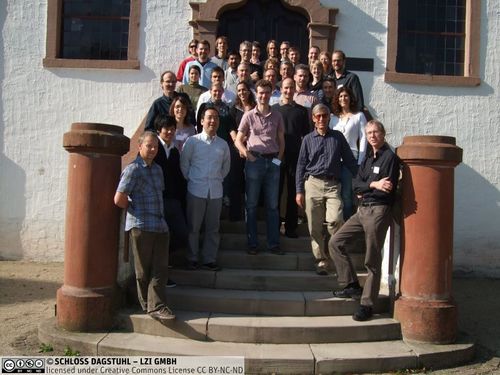Dagstuhl Seminar 10411
Computational Video
( Oct 10 – Oct 15, 2010 )
Permalink
Organizers
- Daniel Cremers (TU München, DE)
- Marcus A. Magnor (TU Braunschweig, DE)
- Lihi Zelnik-Manor (Technion - Haifa, IL)
Contact
Schedule
Dagstuhl seminar 10411 "Computational Video" took place October 10-15, 2010. 43 researchers from North America, Asia, and Europe discussed the state-of-the-art, contemporary challenges and future research in imaging, processing, analyzing, modeling, and rendering of real-world, dynamic scenes. The seminar was organized into 11 sessions of presentations, discussions, and special-topic meetings. The seminar brought together junior and senior researchers from computer vision, computer graphics, and image communication, both from academia and industry to address the challenges in computational video. Participants included international experts from Kyoto University, Stanford University, University of British Columbia, University of New Mexico, University of Toronto, MIT, Hebrew University of Jerusalem, Technion - Haifa, ETH Zrich, Heriot-Watt University - Edinburgh, University of Surrey, and University College London as well as professionals from Adobe Systems, BBC Research & Development, Disney Research and Microsoft Research.
Motivating the seminar is the swift development in video imaging technology, processing algorithms, and applications. Similar to the digital revolution in photography of fifteen years ago, today digital methods are revolutionizing the way television and movies are being made. With the advent of professional digital movie cameras, digital projector technology for movie theaters, and 3D movies, the movie and television production pipeline is turning all-digital, opening up numerous new opportunities for the way dynamic scenes are acquired, video footage can be edited, and visual media may be experienced.
For five days, seminar participants discussed the impact of as well as the opportunities arising from digital video acquisition, processing, representation, and display. Over the course of the seminar, the participants addressed contemporary challenges in digital TV and movie production, pointed at new opportunities in an all-digital production pipeline, discussed novel ways to acquire, represent and experience dynamic content, accrued a wish-list for future video equipment, proposed new ways to interact with visual content, and debated possible future mass-market applications for computational video.
Examples for viable research areas in computational video identified during the seminar included motion capture of faces, non-rigid surfaces and entire performances, reconstruction and modeling of non-rigid objects, acquisition of scene illumination, time-of-ight cameras, motion field and segmentation estimation for video editing, as well as free-viewpoint navigation and video-based rendering. With regard to technological challenges, seminar participants agreed that the "rolling shutter" effect of CMOS-based video imagers currently poses a serious problem for existing computer vision algorithms. It is expected, however, that this problem will be overcome by future video imaging technology, at least for professional equipment. Another item on the seminar participants' wish list for future camera hardware concerned high frame-rate acquisition to enable, e.g., more robust motion field estimation or time-multiplexed acquisition. Finally, it was expected that plenoptic cameras will hit the commercial market within the next few years, allowing for advanced post-processing features such as variable depth-of- field, stereopsis, or motion parallax.
- Derek Bradley (Disney Research - Zürich, CH)
- Daniel Cremers (TU München, DE) [dblp]
- Martin Eisemann (TU Braunschweig, DE) [dblp]
- Peter Eisert (Fraunhofer-Institut - Berlin, DE) [dblp]
- Paolo Favaro (Heriot-Watt University - Edinburgh, GB) [dblp]
- Vittorio Ferrari (ETH Zürich, CH) [dblp]
- Andrew Fitzgibbon (Microsoft Research UK - Cambridge, GB) [dblp]
- Michael Goesele (TU Darmstadt, DE) [dblp]
- Bastian Goldlücke (TU München, DE) [dblp]
- Oliver Grau (BBC - London, GB) [dblp]
- Wolfgang Heidrich (University of British Columbia - Vancouver, CA) [dblp]
- Adrian Hilton (University of Surrey, GB) [dblp]
- Ivo Ihrke (Universität des Saarlandes, DE) [dblp]
- Jan Kautz (University College London, GB) [dblp]
- Maria Klodt (TU München, DE)
- Felix Klose (TU Braunschweig, DE) [dblp]
- Reinhard Koch (Universität Kiel, DE) [dblp]
- Andreas Kolb (Universität Siegen, DE) [dblp]
- Kyros Kutulakos (University of Toronto, CA)
- Laura Leal-Taixé (Leibniz Universität Hannover, DE) [dblp]
- Bastian Leibe (RWTH Aachen, DE) [dblp]
- Hendrik P. A. Lensch (Universität Ulm, DE) [dblp]
- Marc Levoy (Stanford University, US)
- Marcus A. Magnor (TU Braunschweig, DE) [dblp]
- Claudia Nieuwenhuis (TU München, DE)
- Shohei Nobuhara (Kyoto University, JP) [dblp]
- Martin Oswald (TU München, DE)
- Sylvain Paris (Adobe Systems Inc. - Cambridge, US) [dblp]
- Thomas Pock (TU Graz, AT) [dblp]
- Marc Pollefeys (ETH Zürich, CH) [dblp]
- Yael Pritch (The Hebrew University of Jerusalem, IL)
- Ramesh Raskar (MIT - Cambridge, US) [dblp]
- Bodo Rosenhahn (Leibniz Universität Hannover, DE) [dblp]
- Ulrich Schlickewei (TU München, DE)
- Anita Sellent (TU Braunschweig, DE)
- Pradeep Sen (University of New Mexico, US)
- Eli Shechtman (Adobe Systems Inc. - Seattle, US)
- Philipp Slusallek (DFKI - Saarbrücken, DE) [dblp]
- Christian Theobalt (MPI für Informatik - Saarbrücken, DE) [dblp]
- Eno Töppe (TU München, DE)
- Tony Tung (Kyoto University, JP)
- Lihi Zelnik-Manor (Technion - Haifa, IL) [dblp]
- Henning Zimmer (Universität des Saarlandes, DE)
Keywords
- computational photography
- video-based rendering
- 3D video


